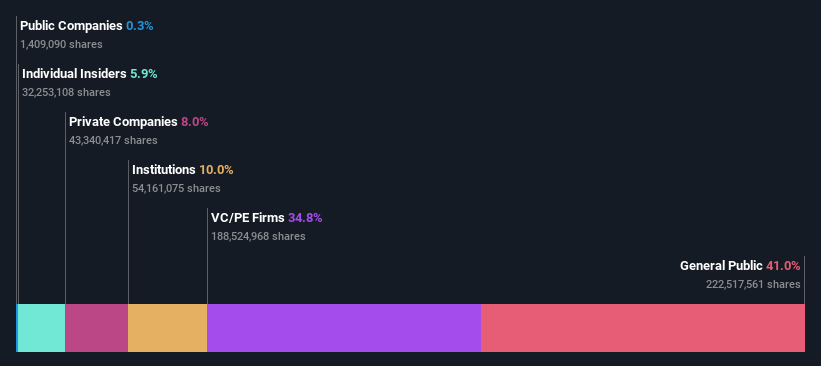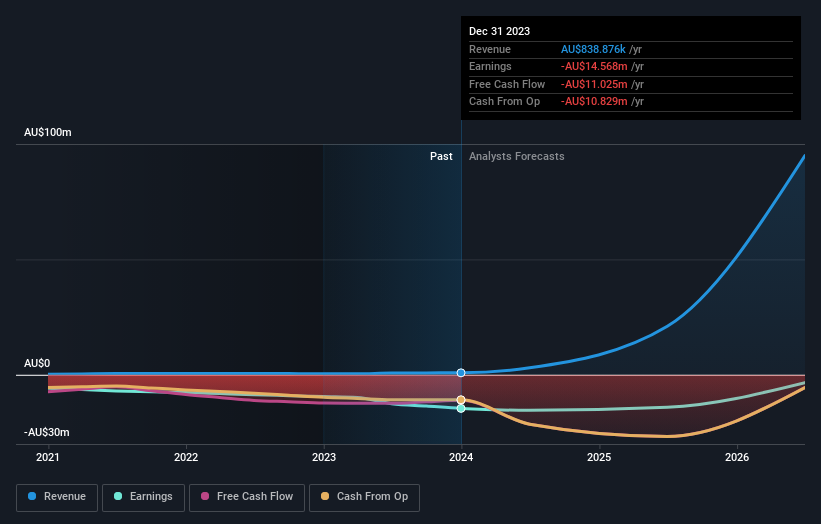Retail investors are Amaero International Ltd's (ASX:3DA) biggest owners and were hit after market cap dropped AU$30m

Key Insights
- The considerable ownership by retail investors in Amaero International indicates that they collectively have a greater say in management and business strategy
- 51% of the business is held by the top 5 shareholders
- Past performance of a company along with ownership data serve to give a strong idea about prospects for a business
To get a sense of who is truly in control of Amaero International Ltd (ASX:3DA), it is important to understand the ownership structure of the business. The group holding the most number of shares in the company, around 41% to be precise, is retail investors. Put another way, the group faces the maximum upside potential (or downside risk).
As market cap fell to AU$217m last week, retail investors would have faced the highest losses than any other shareholder groups of the company.
In the chart below, we zoom in on the different ownership groups of Amaero International.
Check out our latest analysis for Amaero International

What Does The Institutional Ownership Tell Us About Amaero International?
Institutional investors commonly compare their own returns to the returns of a commonly followed index. So they generally do consider buying larger companies that are included in the relevant benchmark index.
We can see that Amaero International does have institutional investors; and they hold a good portion of the company's stock. This suggests some credibility amongst professional investors. But we can't rely on that fact alone since institutions make bad investments sometimes, just like everyone does. When multiple institutions own a stock, there's always a risk that they are in a 'crowded trade'. When such a trade goes wrong, multiple parties may compete to sell stock fast. This risk is higher in a company without a history of growth. You can see Amaero International's historic earnings and revenue below, but keep in mind there's always more to the story.

Amaero International is not owned by hedge funds. Our data shows that Pegasus Growth Capital is the largest shareholder with 35% of shares outstanding. In comparison, the second and third largest shareholders hold about 5.6% and 3.9% of the stock.
To make our study more interesting, we found that the top 5 shareholders control more than half of the company which implies that this group has considerable sway over the company's decision-making.
Researching institutional ownership is a good way to gauge and filter a stock's expected performance. The same can be achieved by studying analyst sentiments. There is some analyst coverage of the stock, but it could still become more well known, with time.
Insider Ownership Of Amaero International
The definition of an insider can differ slightly between different countries, but members of the board of directors always count. Management ultimately answers to the board. However, it is not uncommon for managers to be executive board members, especially if they are a founder or the CEO.
Most consider insider ownership a positive because it can indicate the board is well aligned with other shareholders. However, on some occasions too much power is concentrated within this group.
Our most recent data indicates that insiders own some shares in Amaero International Ltd. In their own names, insiders own AU$13m worth of stock in the AU$217m company. Some would say this shows alignment of interests between shareholders and the board, though we generally prefer to see bigger insider holdings. But it might be worth checking if those insiders have been selling.
General Public Ownership
The general public-- including retail investors -- own 41% stake in the company, and hence can't easily be ignored. While this size of ownership may not be enough to sway a policy decision in their favour, they can still make a collective impact on company policies.
Private Equity Ownership
With a stake of 35%, private equity firms could influence the Amaero International board. Some investors might be encouraged by this, since private equity are sometimes able to encourage strategies that help the market see the value in the company. Alternatively, those holders might be exiting the investment after taking it public.
Private Company Ownership
It seems that Private Companies own 8.0%, of the Amaero International stock. It might be worth looking deeper into this. If related parties, such as insiders, have an interest in one of these private companies, that should be disclosed in the annual report. Private companies may also have a strategic interest in the company.
Next Steps:
It's always worth thinking about the different groups who own shares in a company. But to understand Amaero International better, we need to consider many other factors. To that end, you should learn about the 2 warning signs we've spotted with Amaero International (including 1 which is a bit unpleasant) .
If you are like me, you may want to think about whether this company will grow or shrink. Luckily, you can check this free report showing analyst forecasts for its future.
NB: Figures in this article are calculated using data from the last twelve months, which refer to the 12-month period ending on the last date of the month the financial statement is dated. This may not be consistent with full year annual report figures.
New: Manage All Your Stock Portfolios in One Place
We've created the ultimate portfolio companion for stock investors, and it's free.
• Connect an unlimited number of Portfolios and see your total in one currency
• Be alerted to new Warning Signs or Risks via email or mobile
• Track the Fair Value of your stocks
Have feedback on this article? Concerned about the content? Get in touch with us directly. Alternatively, email editorial-team (at) simplywallst.com.
This article by Simply Wall St is general in nature. We provide commentary based on historical data and analyst forecasts only using an unbiased methodology and our articles are not intended to be financial advice. It does not constitute a recommendation to buy or sell any stock, and does not take account of your objectives, or your financial situation. We aim to bring you long-term focused analysis driven by fundamental data. Note that our analysis may not factor in the latest price-sensitive company announcements or qualitative material. Simply Wall St has no position in any stocks mentioned.
About ASX:3DA
Amaero International
Engages in the research, development, manufacture, and sale of refractory metals and specialty alloy powders in the United States.
Exceptional growth potential with excellent balance sheet.


